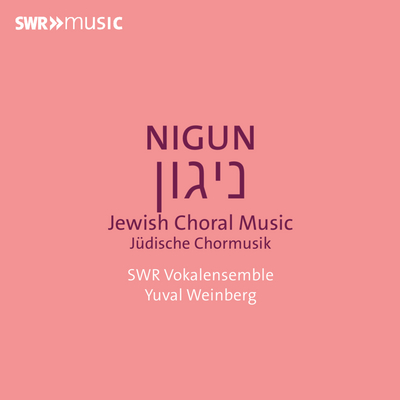Nigun - Jewish Choral Music

Artikelinfo
2024 / 2025
2025
Aharon Harlap
Ödön Pártos
Yehezkel Braun
Shiri Riseman
Tzvi Avni
Dov Carmel
Traditionell
Gil Aldema
Menachem Wiesenberg
Pinchas Minkowski
Sara Shoham
SWR Vokalensemble
Yuval Weinberg (cond.)
1) Aharon Harlap: Akeidat Ytzchak (Die Bindung Isaaks)
2) Ödön Partos: Hamawdil (Shabbatlied)
3) Yehezkel Braun: Vayimalet Kayin (Als Kain flüchtete)
4) Yehezkel Braun: D'ror Yikra (Er wird die Freiheit verkünden)
5) Shiri Riseman: Chidot (Rätsel)
6-8) Tzvi Avni: Mizmorei tehilim (Psalmen 47, 48, 150)
9) Yehezkel Braun: Shir Hashirim (Hohelied, Kapitel 3)
10) Dov Carmel: Uri Tsafon (Erhebe dich, Nordwind)
11) Traditional: Tsur mishelo achalnu (Der Herr ist mein Fels)1
12) Gil Aldema: Tsur nishelo achalnu
13) Menachem Wiesenberg: Chuter (In der Hütte ) aus Wer wet bleib'n, wos wet bleib'n
14) Menachem Wiesenberg: A Wogen Schich (Ein Wagen Schuhe) aus Wer wet bleib'n, wos wet bleib'n
15) Pinchas Minkovsky: Shabbat Hamalka (Shabbat, die Königin)
In 1955, the conductor Gary Bertini founded the Rinat Choir and thus established professional choral music in Israel. The founding of the Rinat had a significant influence on the development of
the Israeli choral scene; the choir was finally named the national choir in 1972. Psalms, verses and hymns were set to music for the Rinat Choir by the country's leading composers and transformed
into extensive Hebrew motets and oratorios.
The founding generation of Israeli music consisted of outstanding professional musicians who were born in Europe around the turn of the century. Although these composers came predominantly from Germany, Eastern Europe and Russia, their sources of inspiration can by no means be reduced to the music of their respective countries of origin. On the contrary: what united many of these composers was their fascination with the traditional music of the Jews, especially of Sephardic, Persian and Yemenite origin, and with the music of the Arabs they encountered in Palestine.
The next generation of Israeli composers were not necessarily born in Israel either, but were strongly influenced musically by this country from the very beginning. In the 1960s and 70s, this generation disseminated their inspirational sources and borrowed from contemporary styles that they had become familiar with during their studies in Europe and the USA. While some representatives of this generation carried on the tradition of the founding generation, other composers introduced current developments in the musical world into the Israeli art music of their time. The pool of influences was also expanded to include American composers such as Aaron Copland, George Gershwin, John Cage and Lukas Foss.